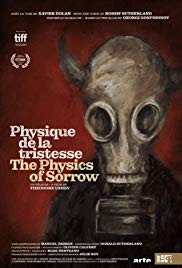Summary
Based on the novel by Bulgarian writer Georgi Gospodinov, the film tells the story of a man reminiscing about his childhood as he struggles to understand the meaning and purpose of his life. [1]
The narrative of The Physics of Sorrow is nonlinear, fragmented, and dreamlike, much like the workings of human memory. It follows the introspective journey of a nameless protagonist, voiced by Rossif Sutherland, as he reflects on his life and the idea of feeling trapped, much like a mythological figure from ancient stories—the Minotaur. This mythical creature, trapped in a labyrinth, serves as a central metaphor for the protagonist's own feelings of isolation, alienation, and confusion.
Childhood and Family
The protagonist begins by recalling his childhood in Bulgaria, where he was born and raised in a post-communist society. His father was emotionally distant, and his family’s history, like the history of the country, is marked by loss, hardship, and displacement. The film dives into personal memories of family meals, childhood adventures, and early encounters with existential questions. The connection with his grandfather plays a significant role in shaping the protagonist’s identity. The grandfather’s life, shaped by wars and political unrest, parallels the protagonist's own inner turmoil.
Displacement and Emigration
As the protagonist grows older, he moves to Canada in search of a new life, like many emigrants fleeing political and economic hardships. This new life brings him no closer to happiness. Instead, he feels increasingly alienated and lost in his new environment, cut off from his roots, family, and sense of belonging. His disconnection from his past and homeland deepens, and he becomes like the Minotaur, trapped in his own mental labyrinth of sorrow and nostalgia.
The film continually shifts between the protagonist’s memories of Bulgaria and his life in Canada, showcasing the sense of dislocation experienced by many immigrants. Through poetic narration, he reflects on the cyclical nature of time and the ways memories blend into one another, losing coherence but never losing their emotional power.
The film repeatedly returns to the myth of the Minotaur, a half-human, half-bull creature imprisoned in a labyrinth. The protagonist sees himself as a modern-day Minotaur, wandering lost through his own personal labyrinth of memories, time, and sorrow. He struggles to find meaning and purpose in a world where he feels out of place, much like the creature trapped without an escape. This metaphor extends to the broader immigrant experience of feeling trapped between worlds, neither fully belonging to their homeland nor to their adopted country.
Reflections on Time and Memory
The film meditates on the fluidity of time. Memories are depicted as fleeting, overlapping, and sometimes unreliable. The protagonist laments how moments from the past are both painfully distant yet omnipresent, haunting his everyday life. He also reflects on the concept of entropy and the inevitable decay of everything, from physical objects to human relationships. This reflection on time is reinforced by the Minotaur myth, where time loops and memories entrap him.
In the final moments, the protagonist seems to reach a bittersweet acceptance of his sorrow, recognizing that while the labyrinth of life may be inescapable, the exploration of it—the collection of memories and experiences—is what makes life meaningful, even in its sadness.
This page is based on this
Wikipedia article Text is available under the
CC BY-SA 4.0 license; additional terms may apply.
Images, videos and audio are available under their respective licenses.
